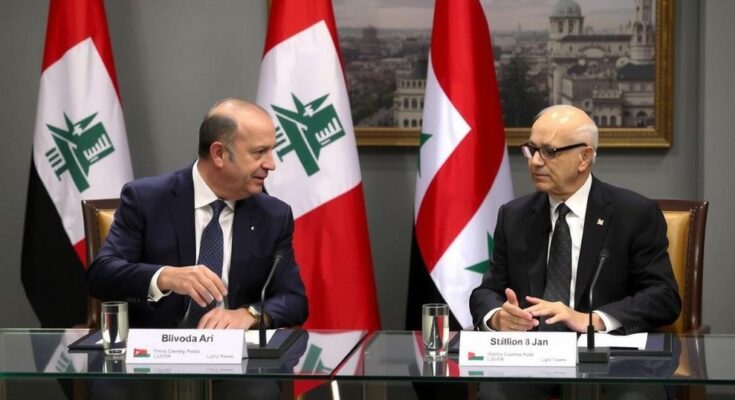Lebanon’s Prime Minister Najib Mikati visited Syria, marking the first such visit since the civil war began in 2011. Mikati and new Syrian leader Ahmed al-Sharaa pledged to strengthen ties, particularly addressing the pressing issue of Syrian refugees in Lebanon and managing border relations. Recent political changes in Lebanon with Joseph Aoun’s presidency set the stage for a renewed partnership, emphasizing cooperation and dialogue.
In a historic visit marking the first attendance of a Lebanese Prime Minister in Syria since the onset of the civil war in 2011, Prime Minister Najib Mikati and Syria’s new leader Ahmed al-Sharaa expressed commitments to strengthening ties between their nations. This meeting occurred subsequent to significant political shifts in the region, including the recent end of Bashar al-Assad’s rule following the capture of Damascus by Islamist-led forces.
Prime Minister Mikati’s visit coincided with Lebanon’s recent election of President Joseph Aoun, following a two-year political stalemate. Sharaa indicated a desire for renewed bilateral relations, emphasizing shared interests and the necessity for constructive dialogue to resolve long-standing issues, particularly regarding the approximately two million Syrian refugees residing in Lebanon since the onset of the Syrian conflict.
Additionally, Mikati underscored the importance of establishing maritime and land boundaries and addressing illicit smuggling across the largely unmarked border, which poses significant challenges to both countries. The new era of Lebanese-Syrian relations appears defined by a mutual intent to cooperate economically and politically, with external diplomatic engagements from various nations further emphasizing the global interest in this regional partnership.
The article details a significant diplomatic engagement between Syria and Lebanon following years of tension due to the Syrian civil war, which began in 2011. Lebanon’s historical relationship with Syria has been complex, tainted by Syrian military presence in Lebanon and the influence of Hezbollah, a group that supported Bashar al-Assad during the conflict. The recent shifts in Syrian leadership and Lebanon’s political landscape indicate a potential opening for reconciliation and collaboration, particularly surrounding refugee issues and border management.
Overall, this meeting signals a pivotal development in Lebanese-Syrian relations, as both leaders aim to foster a cooperative environment based on mutual respect and shared objectives. The emphasis on resolving refugee challenges, managing border security, and addressing historical grievances points to a desire for stability and future economic collaboration, reflecting a notable shift in the regional dynamics post-civil war.
Original Source: www.northwestsignal.net




